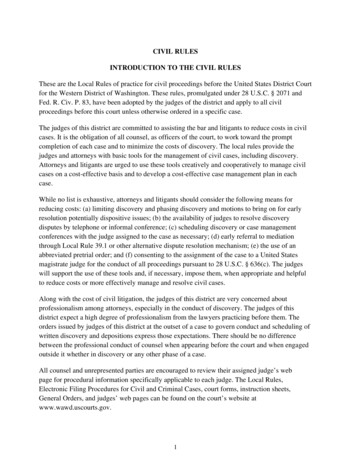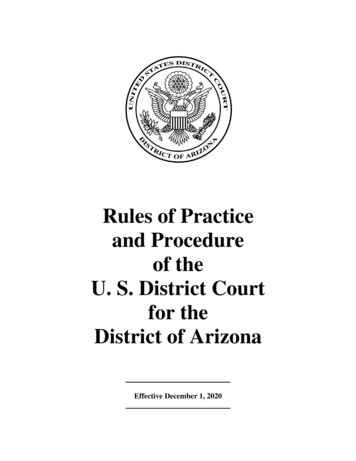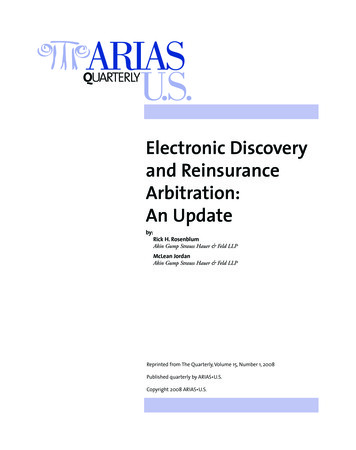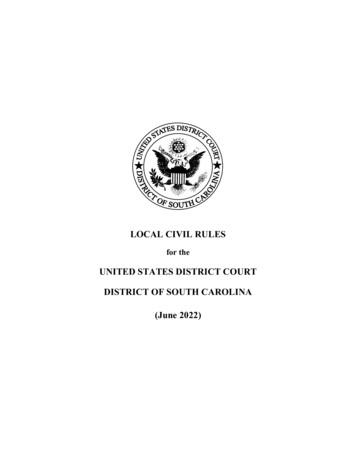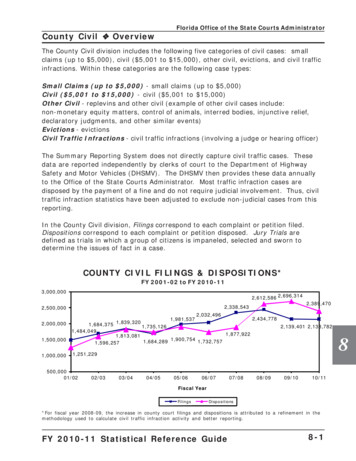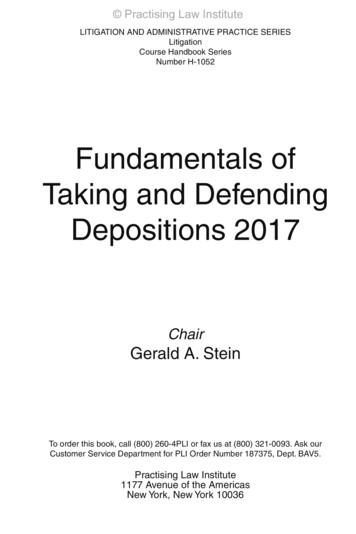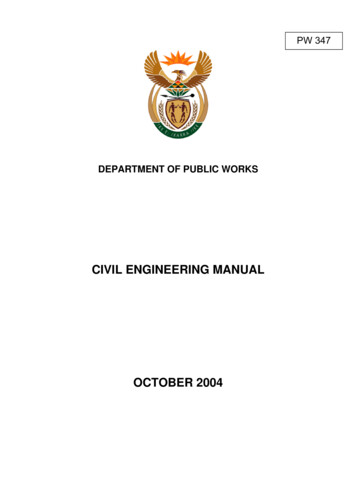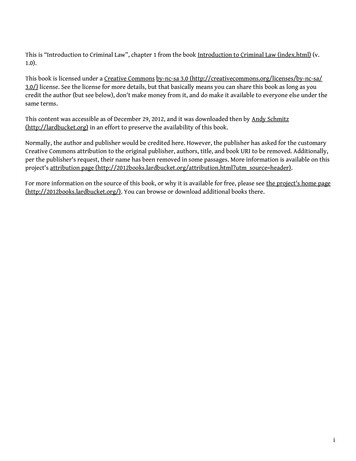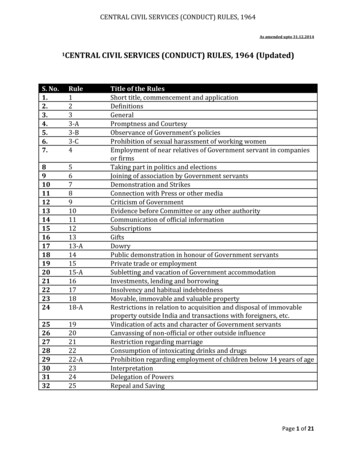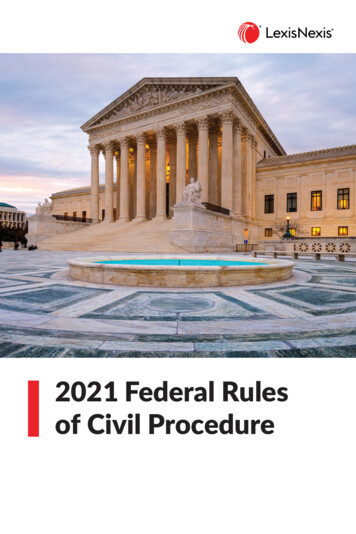
Transcription
2021 Federal Rulesof Civil Procedure
Compliments ofFEDERAL RULES OF CIVIL PROCEDUREI.SCOPE OF RULES; FORM OF ACTION1Rule 1.Scope and Purpose1Rule 2.One Form of Action1II.COMMENCING AN ACTION; SERVICEOF PROCESS, PLEADINGS, MOTIONS,AND ORDERS1Rule 3.Commencing an Action1Rule 4.SummonsRule 4.1.Serving Other Process131Rule 5.Serving and Filing Pleadings and Other Papers14Rule 5.1.Constitutional Challenge to a Statute—Notice,Certification, and Intervention18Rule 5.2.Privacy Protection For Filings Made withthe Court19Rule 6.Computing and Extending Time; Time forMotion Papers23III.PLEADINGS AND MOTIONS24Rule 7.Pleadings Allowed; Form of Motions andOther Papers24Rule 7.1.Disclosure Statement25Rule 8.General Rules of Pleading25Rule 9.Pleading Special Matters28Rule 10.Form of Pleadings30Rule 11.Signing Pleadings, Motions, and Other Papers;Representations to the Court; Sanctions30
Federal Rules of Civil ProcedureRule 12.Defenses and Objections: When and HowPresented; Motion for Judgment on thePleadings; Consolidating Motions; WaivingDefenses; Pretrial HearingRule 13.Counterclaim and Crossclaim37Rule 14.Third-Party Practice39Rule 15.Amended and Supplemental Pleadings41Rule 16.Pretrial Conferences; Scheduling; Management4333IV.PARTIES48Rule 17.Plaintiff and Defendant; Capacity;Public Officers48Rule 18.Joinder of Claims50Rule 19.Required Joinder of Parties50Rule 20.Permissive Joinder of Parties52Rule 21.Misjoinder and Nonjoinder of Parties53Rule 22.Interpleader53Rule 23.Class Actions54Rule 23.1.Derivative Actions62Rule 23.2.Actions Relating to Unincorporated Associations63Rule 24.Intervention63Rule 25.Substitution of Parties65V.DISCLOSURES AND DISCOVERY66Rule 26.Duty to Disclose; General ProvisionsGoverning Discovery66Rule 27.Depositions to Perpetuate Testimony82Rule 28.Persons Before Whom DepositionsMay Be Taken85
Compliments ofRule 29.Stipulations About Discovery Procedure87Rule 30.Depositions by Oral Examination87Rule 31.Depositions by Written Questions95Rule 32.Using Depositions in Court ProceedingsRule 33.Interrogatories to Parties101Rule 34.Producing Documents, ElectronicallyStored Information, and Tangible Things,or Entering onto Land, for Inspectionand Other Purposes102Rule 35.Physical and Mental Examinations105Rule 36.Requests for Admission107Rule 37.Failure to Make Disclosures or to Cooperatein Discovery; Sanctions109VI.TRIALS116Rule 38.Right to a Jury Trial; Demand116Rule 39.Trial by Jury or by the Court117Rule 40.Scheduling Cases for Trial117Rule 41.Dismissal of Actions118Rule 42.Consolidation; Separate Trials119Rule 43.Taking Testimony120Rule 44.Proving an Official Record120Rule 44.1.Determining Foreign Law122Rule 45.Subpoena123Rule 46.Objecting to a Ruling or Order130Rule 47.Selecting Jurors131Rule 48.Number of Jurors; Verdict; Polling131Rule 49.Special Verdict; General Verdict and Questions13297
Federal Rules of Civil ProcedureRule 50.Judgment as a Matter of Law in a Jury Trial;Related Motion for a New Trial;Conditional Ruling133Rule 51.Instructions to the Jury; Objections;Preserving a Claim of Error135Rule 52.Findings and Conclusions by the Court;Judgment on Partial Findings137Rule 53.Masters139VII.JUDGMENT143Rule 54.Judgment; Costs143Rule 55.Default; Default Judgment145Rule 56.Summary Judgment146Rule 57.Declaratory Judgment149Rule 58.Entering Judgment149Rule 59.New Trial; Altering or Amending a Judgment151Rule 60.Relief from a Judgment or Order152Rule 61.Harmless Error153Rule 62.Stay of Proceedings to Enforce a Judgment154Rule 62.1.Indicative Ruling on a Motion for ReliefThat is Barred by a Pending Appeal156Rule 63.Judge’s Inability to Proceed156VIII.PROVISIONAL AND FINAL REMEDIES157Rule 64.Seizing a Person or Property157Rule 65.Injunctions and Restraining Orders157Rule 65.1.Proceedings Against a Surety160Rule 66.Receivers160Rule 67.Deposit into Court161
Compliments ofRule 68.Offer of Judgment161Rule 69.Execution162Rule 70.Enforcing a Judgment for a Specific Act163Rule 71.Enforcing Relief For or Against a Nonparty163IX.SPECIAL PROCEEDINGS164Rule 71.1.Condemning Real or Personal Property164Rule 72.Magistrate Judges: Pretrial Order172Rule 73.Magistrate Judges: Trial by Consent; Appeal173Rule 74.[Abrogated.]174Rule 75.[Abrogated.]174Rule 76.[Abrogated.]174X.DISTRICT COURTS AND CLERKS:CONDUCTING BUSINESS; ISSUING ORDERS174Rule 77.Conducting Business; Clerk’s Authority;Notice of an Order or Judgment174Rule 78.Hearing Motions; Submission on Briefs176Rule 79.Records Kept by the Clerk176Rule 80.Stenographic Transcript as Evidence177XI.GENERAL PROVISIONS178Rule 81.Applicability of the Rules in General;Removed Actions178Rule 82.Jurisdiction and Venue Unaffected181Rule 83.Rules by District Courts; Judge’s Directives181Rule 84.[Abrogated.]182Rule 85.Title182Rule 86.Effective Dates182
Federal Rules of Civil Procedure
Compliments ofFEDERAL RULES OF CIVIL PROCEDUREI. SCOPE OF RULES; FORM OF ACTIONRule 1. Scope and PurposeThese rules govern the procedure in all civil actions andproceedings in the United States district courts, except asstated in Rule 81. They should be construed, administered,and employed by the court and the parties to secure thejust, speedy, and inexpensive determination of every actionand proceeding.Rule 2. One Form of ActionThere is one form of action—the civil action.II. COMMENCING AN ACTION; SERVICE OF PROCESS,PLEADINGS, MOTIONS, AND ORDERSRule 3. Commencing an ActionA civil action is commenced by filing a complaint with thecourt.Rule 4. Summons(a) Contents; Amendments.( 1 ) Contents. A summons must:(A) name the court and the parties;(B) be directed to the defendant;(C) state the name and address of the plaintiff’sattorney or—if unrepresented—of the plaintiff;(D) state the time within which the defendant mustappear and defend;(E) notify the defendant that a failure to appear anddefend will result in a default judgment against thedefendant for the relief demanded in the complaint;1
Federal Rules of Civil Procedure(F) be signed by the clerk; and(G) bear the court’s seal.(2) Amendments. The court may permit a summons to beamended.(b) Issuance. On or after filing the complaint, the plaintiff maypresent a summons to the clerk for signature and seal. If thesummons is properly completed, the clerk must sign, seal,and issue it to the plaintiff for service on the defendant.A summons—or a copy of a summons that is addressed tomultiple defendants—must be issued for each defendant tobe served.(c) Service.( 1 ) In General. A summons must be served with a copy ofthe complaint. The plaintiff is responsible for having thesummons and complaint served within the time allowedby Rule 4(m) and must furnish the necessary copies tothe person who makes service.(2) By Whom. Any person who is at least 18 years old andnot a party may serve a summons and complaint.(3) By a Marshal or Someone Specially Appointed. At theplaintiff’s request, the court may order that service bemade by a United States marshal or deputy marshal orby a person specially appointed by the court. The courtmust so order if the plaintiff is authorized to proceed informa pauperis under 28 U.S.C. § 1915 or as a seamanunder 28 U.S.C. § 1916.(d) Waiving Service.( 1 ) Requesting a Waiver. An individual, corporation, orassociation that is subject to service under Rule 4(e),(f), or (h) has a duty to avoid unnecessary expensesof serving the summons. The plaintiff may notify sucha defendant that an action has been commenced andrequest that the defendant waive service of a summons.2
Compliments ofThe notice and request must:(A) be in writing and be addressed:(i) to the individual defendant; or(i i) for a defendant subject to service under Rule4(h), to an officer, a managing or general agent,or any other agent authorized by appointmentor by law to receive service of process;(B) name the court where the complaint was filed;(C) be accompanied by a copy of the complaint, 2copies of the waiver form appended to this Rule 4,and a prepaid means for returning the form;(D) inform the defendant, using the form appended tothis Rule 4, of the consequences of waiving and notwaiving service;(E) state the date when the request is sent;(F) give the defendant a reasonable time of at least30 days after the request was sent—or at least 60days if sent to the defendant outside any judicialdistrict of the United States—to return the waiver;and(G) be sent by first-class mail or other reliable means.(2) Failure to Waive. If a defendant located within theUnited States fails, without good cause, to sign andreturn a waiver requested by a plaintiff located withinthe United States, the court must impose on thedefendant:(A) the expenses later incurred in making service; and(B) the reasonable expenses, including attorney’s fees,of any motion required to collect those serviceexpenses.(3) Time to Answer After a Waiver. A defendant who,before being served with process, timely returns a3
Federal Rules of Civil Procedurewaiver need not serve an answer to the complaint until60 days after the request was sent—or until 90 daysafter it was sent to the defendant outside any judicialdistrict of the United States.(4) Results of Filing a Waiver. When the plaintiff files awaiver, proof of service is not required and these rulesapply as if a summons and complaint had been served atthe time of filing the waiver.(5) Jurisdiction and Venue Not Waived.Waiving service of a summons does not waive anyobjection to personal jurisdiction or to venue.(e) Serving an Individual Within a Judicial District of theUnited States. Unless federal law provides otherwise, anindividual—other than a minor, an incompetent person, ora person whose waiver has been filed—may be served in ajudicial district of the United States by:( 1 ) following state law for serving a summons in an actionbrought in courts of general jurisdiction in the statewhere the district court is located or where service ismade; or(2) doing any of the following:(A) delivering a copy of the summons and of thecomplaint to the individual personally;(B) leaving a copy of each at the individual’s dwelling orusual place of abode with someone of suitable ageand discretion who resides there; or(C) delivering a copy of each to an agent authorizedby appointment or by law to receive service ofprocess.(f) Serving an Individual in a Foreign Country. Unless federallaw provides otherwise, an individual—other than a minor,an incompetent person, or a person whose waiver has4
Compliments ofbeen filed—may be served at a place not within any judicialdistrict of the United States:( 1 ) by any internationally agreed means of service thatis reasonably calculated to give notice, such as thoseauthorized by the Hague Convention on the ServiceAbroad of Judicial and Extrajudicial Documents;(2) if there is no internationally agreed means, or if aninternational agreement allows but does not specifyother means, by a method that is reasonably calculatedto give notice:(A) as prescribed by the foreign country’s law forservice in that country in an action in its courts ofgeneral jurisdiction;(B) as the foreign authority directs in response to aletter rogatory or letter of request; or(C) unless prohibited by the foreign country’s law, by:(i) delivering a copy of the summons and of thecomplaint to the individual personally; or(ii) using any form of mail that the clerk addressesand sends to the individual and that requires asigned receipt; or(3) by other means not prohibited by internationalagreement, as the court orders.(g) Serving a Minor or an Incompetent Person. A minor or anincompetent person in a judicial district of the UnitedStates must be served by following state law for serving asummons or like process on such a defendant in an actionbrought in the courts of general jurisdiction of the statewhere service is made. A minor or an incompetent personwho is not within any judicial district of the United Statesmust be served in the manner prescribed by Rule 4(f)(2)(A),(f )(2)(B), or (f )(3).5
Federal Rules of Civil Procedure(h) Serving a Corporation, Partnership, or Association. Unlessfederal law provides otherwise or the defendant’s waiverhas been filed, a domestic or foreign corporation, or apartnership or other unincorporated association that issubject to suit under a common name, must be served:( 1 ) in a judicial district of the United States:(A) in the manner prescribed by Rule 4(e)( 1 ) forserving an individual; or(B) by delivering a copy of the summons and ofthe complaint to an officer, a managing orgeneral agent, or any other agent authorized byappointment or by law to receive service of processand—if the agent is one authorized by statute andthe statute so requires—by also mailing a copy ofeach to the defendant; or(2) at a place not within any judicial district of the UnitedStates, in any manner prescribed by Rule (f) for servingan individual, except personal delivery under (f)(2)(C)(i).(i) Serving the United States and Its Agencies, Corporations,Officers, or Employees.(1) United States. To serve the United States, a party must:(A) (i) deliver a copy of the summons and of thecomplaint to the United States attorney forthe district where the action is brought—or toan assistant United States attorney or clericalemployee whom the United States attorneydesignates in a writing filed with the courtclerk—or(i i) send a copy of each by registered or certifiedmail to the civil-process clerk at theUnited States attorney’s office;6
Compliments of(B) send a copy of each by registered or certified mailto the Attorney General of the United States atWashington, D.C.; and(C) if the action challenges an order of a nonpartyagency or officer of the United States, send a copyof each by registered or certified mail to the agencyor officer.(2) Agency; Corporation; Officer or Employee Sued in anOfficial Capacity. To serve a United States agency orcorporation, or a United States officer or employeesued only in an official capacity, a party must serve theUnited States and also send a copy of the summons andof the complaint by registered or certified mail to theagency, corporation, officer, or employee.(3) Officer or Employee Sued Individually. To serve aUnited States officer or employee sued in an individualcapacity for an act or omission occurring in connectionwith duties performed on the United States’ behalf(whether or not the officer or employee is also suedin an official capacity), a party must serve the UnitedStates and also serve the officer or employee underRule 4(e), (f), or (g).(4) Extending Time. The court must allow a party areasonable time to cure its failure to:(A) serve a person required to be served under Rule4(i)(2), if the party has served either the UnitedStates attorney or the Attorney General of theUnited States; or(B) serve the United States under Rule 4(i)(3), if theparty has served the United States officer oremployee.7
Federal Rules of Civil Procedure( j) Serving a Foreign, State, or Local Government.( 1 ) Foreign State. A foreign state or its political subdivision,agency, or instrumentality must be served in accordancewith 28 U.S.C. § 1608.(2) State or Local Government. A state, a municipalcorporation, or any other state-created governmentalorganization that is subject to suit must be served by:(A) delivering a copy of the summons and of thecomplaint to its chief executive officer; or(B) serving a copy of each in the manner prescribedby that state’s law for serving a summons or likeprocess on such a defendant.(k) Territorial Limits of Effective Service.( 1 ) In General. Serving a summons or filing a waiver ofservice establishes personal jurisdiction over a defendant:(A) who is subject to the jurisdiction of a court ofgeneral jurisdiction in the state where the districtcourt is located;(B) who is a party joined under Rule 14 or 19 and isserved within a judicial district of the United Statesand not more than 100 miles from where thesummons was issued; or(C) when authorized by a federal statute.(2) Federal Claim Outside State-Court Jurisdiction. For aclaim that arises under federal law, serving a summonsor filing a waiver of service establishes personaljurisdiction over a defendant if:(A) the defendant is not subject to jurisdiction in anystate’s courts of general jurisdiction; and(B) exercising jurisdiction is consistent with the UnitedStates Constitution and laws.8
Compliments of(l) Proving Service.( 1 ) Affidavit Required. Unless service is waived, proof ofservice must be made to the court. Except for serviceby a United States marshal or deputy marshal, proofmust be by the server’s affidavit.(2) Service Outside the United States. Service not withinany judicial district of the United States must be provedas follows:(A) if made under Rule 4(f)( 1 ), as provided in theapplicable treaty or convention; or(B) if made under Rule 4(f)(2) or (f)(3), by a receiptsigned by the addressee, or by other evidencesatisfying the court that the summons andcomplaint were delivered to the addressee.(3) Validity of Service; Amending Proof. Failure to proveservice does not affect the validity of service. The courtmay permit proof of service to be amended.(m) Time Limit for Service. If a defendant is not served within90 days after the complaint is filed, the court—on motionor on its own after notice to the plaintiff—must dismissthe action without prejudice against that defendant ororder that service be made within a specified time. But ifthe plaintiff shows good cause for the failure, the courtmust extend the time for service for an appropriate period.This subdivision (m) does not apply to service in a foreigncountry under Rule 4(f), 4(h)(2), or 4(j)(1), or to service of anotice under Rule 71.1(d)(3)(A).(n) Asserting Jurisdiction over Property or Assets.( 1 ) Federal Law. The court may assert jurisdiction overproperty if authorized by a federal statute. Notice toclaimants of the property must be given as provided inthe statute or by serving a summons under this rule.9
Federal Rules of Civil Procedure(2) State Law. On a showing that personal jurisdictionover a defendant cannot be obtained in the districtwhere the action is brought by reasonable efforts toserve a summons under this rule, the court may assertjurisdiction over the defendant’s assets found in thedistrict. Jurisdiction is acquired by seizing the assetsunder the circumstances and in the manner provided bystate law in that district.Rule 4. Notice of a Lawsuit and Request to WaiveService of Summons.(Caption)To (name the defendant or—if the defendant is a corporation,partnership, or association—name an officer or agent authorizedto receive service):Why are you getting this?A lawsuit has been filed against you, or the entity yourepresent, in this court under the number shown above.A copy of the complaint is attached.This is not a summons, or an official notice from the court.It is a request that, to avoid expenses, you waive formalservice of a summons by signing and returning the enclosedwaiver. To avoid these expenses, you must return the signedwaiver within (give at least 30 days or at least 60 days if thedefendant is outside any judicial district of the United States)from the date shown below, which is the date this noticewas sent. Two copies of the waiver form are enclosed, alongwith a stamped, self-addressed envelope or other prepaidmeans for returning one copy. You may keep the other copy.10
Compliments ofWhat happens next?If you return the signed waiver, I will file it with the court.The action will then proceed as if you had been served onthe date the waiver is filed, but no summons will be servedon you and you will have 60 days from the date this noticeis sent (see the date below) to answer the complaint (or 90days if this notice is sent to you outside any judicial districtof the United States).If you do not return the signed waiver within the timeindicated, I will arrange to have the summons and complaintserved on you. And I will ask the court to require you, or theentity you represent, to pay the expenses of making service.Please read the enclosed statement about the duty to avoidunnecessary expenses.I certify that this request is being sent to you on the datebelow.Date:(Signature of the attorney or unrepresented party)(Printed name)(Address)(E-mail address)(Telephone number)11
Federal Rules of Civil ProcedureRule 4. Waiver of the Service of Summons.(Caption)To (name the plaintiff’s attorney or the unrepresented plaintiff):I have received your request to waive service of a summonsin this action along with a copy of the complaint, two copiesof this waiver form, and a prepaid means of returning onesigned copy of the form to you.I, or the entity I represent, agree to save the expense ofserving a summons and complaint in this case.I understand that I, or the entity I represent, will keep alldefenses or objections to the lawsuit, the court’s jurisdiction,and the venue of the action, but that I waive any objectionsto the absence of a summons or of service.I also understand that I, or the entity I represent, must fileand serve an answer or a motion under Rule 12 within 60days from , the date when this requestwas sent (or 90 days if it was sent outside the United States).If I fail to do so, a default judgment will be entered againstme or the entity I represent.Date:(Signature of the attorney or unrepresented party)(Printed name)(Address)(E-mail address)(Telephone number)12
Compliments of(Attach the following)Duty to Avoid Unnecessary Expenses of Serving aSummonsRule 4 of the Federal Rules of Civil Procedure requirescertain defendants to cooperate in saving unnecessaryexpenses of serving a summons and complaint. A defendantwho is located in the United States and who fails to returna signed waiver of service requested by a plaintiff locatedin the United States will be required to pay the expensesof service, unless the defendant shows good cause for thefailure.“Good cause” does not include a belief that the lawsuitis groundless, or that it has been brought in an impropervenue, or that the court has no jurisdiction over this matteror over the defendant or the defendant’s property.If the waiver is signed and returned, you can still make theseand all other defenses and objections, but you cannot objectto the absence of a summons or of service.If you waive service, then you must, within the time specifiedon the waiver form, serve an answer or a motion under Rule12 on the plaintiff and file a copy with the court. By signingand returning the waiver form, you are allowed more time torespond than if a summons had been served.Rule 4.1. Serving Other Process(a) In General. Process—other than a summons under Rule 4or a subpoena under Rule 45—must be served by a UnitedStates marshal or deputy marshal or by a person speciallyappointed for that purpose. It may be served anywhere13
Federal Rules of Civil Procedurewithin the territorial limits of the state where the districtcourt is located and, if authorized by a federal statute,beyond those limits. Proof of service must be made underRule 4(l).(b) Enforcing Orders: Committing for Civil Contempt. Anorder committing a person for civil contempt of a decree orinjunction issued to enforce federal law may be served andenforced in any district. Any other order in a civil-contemptproceeding may be served only in the state where theissuing court is located or elsewhere in the United Stateswithin 100 miles from where the order was issued.Rule 5. Serving and Filing Pleadings and Other Papers(a) Service: When Required.( 1 ) In General. Unless these rules provide otherwise, eachof the following papers must be served on every party:(A) an order stating that service is required;(B) a pleading filed after the original complaint, unlessthe court orders otherwise under Rule 5(c) becausethere are numerous defendants;(C) a discovery paper required to be served on a party,unless the court orders otherwise;(D) a written motion, except one that may be heardex parte; and(E) a written notice, appearance, demand, or offer ofjudgment, or any similar paper.(2) If a Party Fails to Appear. No service is required ona party who is in default for failing to appear. But apleading that asserts a new claim for relief against sucha party must be served on that party under Rule 4.14
Compliments of(3) Seizing Property. If an action is begun by seizingproperty and no person is or need be named as adefendant, any service required before the filing ofan appearance, answer, or claim must be made on theperson who had custody or possession of the propertywhen it was seized.(b) Service: How Made.( 1 ) Serving an Attorney. If a party is represented by anattorney, service under this rule must be made on theattorney unless the court orders service on the party.(2) Service in General. A paper is served under this rule by:(A) handing it to the person;(B) leaving it:(i) at the person’s office with a clerk or otherperson in charge or, if no one is in charge, in aconspicuous place in the office; or(i i) if the person has no office or the office isclosed, at the person’s dwelling or usual placeof abode with someone of suitable age anddiscretion who resides there;(C) mailing it to the person’s last known address—in which event service is complete upon mailing;(D) leaving it with the court clerk if the person has noknown address;(E) sending it to a registered user by filing it with thecourt’s electronic-filing system or sending it byother electronic means that the person consentedto in writing—in either of which events service iscomplete upon filing or sending, but is not effectiveif the filer or sender learns that it did not reach theperson to be served; or15
Federal Rules of Civil Procedure(F) delivering it by any other means that the personconsented to in writing—in which event service iscomplete when the person making service deliversit to the agency designated to make delivery.(3) Using Court Facilities. [Abrogated (Apr. , 2018, eff.Dec. 1, 2018.)] .(c) Serving Numerous Defendants.( 1 ) In General. If an action involves an unusually largenumber of defendants, the court may, on motion or onits own, order that:(A) defendants’ pleadings and replies to them need notbe served on other defendants;(B) any crossclaim, counterclaim, avoidance, oraffirmative defense in those pleadings and repliesto them will be treated as denied or avoided by allother parties; and(C) filing any such pleading and serving it on theplaintiff constitutes notice of the pleading to allparties.(2) Notifying Parties. A copy of every such order must beserved on the parties as the court directs.(d) Filing.(1) Required Filings; Certificate of Service.(A) Papers after the Complaint. Any paper after thecomplaint that is required to be served must befiled no later than a reasonable time after service.But disclosures under Rule 26(a)(1) or (2) and thefollowing discovery requests and responses mustnot be filed until they are used in the proceeding orthe court orders filing: depositions, interrogatories,16
Compliments ofrequests for documents or tangible things or topermit entry onto land, and requests for admission.(B) Certificate of Service. No certificate of service isrequired when a paper is served by filing it with thecourt’s electronic-filing system. When a paper thatis required to be served is served by other means:(i) if the paper is filed, a certificate of servicemust be filed with it or within a reasonabletime after service; and(ii) if the paper is not filed, a certificate of serviceneed not be filed unless filing is required bycourt order or by local rule.(2) Nonelectronic Filing. A paper not filed electronically isfiled by delivering it:(A) to the clerk; or(B) to a judge who agrees to accept it for filing, andwho must then note the filing date on the paperand promptly send it to the clerk.(3) Electronic Filing and Signing.(A) By a Represented Person—Generally Required;Exceptions. A person represented by an attorneymust file electronically, unless nonelectronic filingis allowed by the court for good cause or is allowedor required by local rule.(B) By an Unrepresented Person—When Allowed orRequired. A person not represented by an attorney:(i) may file electronically only if allowed by courtorder or by local rule; and(ii) may be required to file electronically only bycourt order, or by a local rule that includesreasonable exceptions.17
Federal Rules of Civil Procedure(C) Signing. A filing made through a person’s electronicfiling account and authorized by that person,together with that person’s name on a signatureblock, constitutes the person’s signature.(D) Same as a Written Paper. A paper filedelectronically is a written paper for purposes ofthese rules.(4) Acceptance by the Clerk. The clerk must not refuseto file a paper solely because it is not in the formprescribed by these rules or by a local rule or practice.Rule 5.1. Constitutional Challenge to a Statute—Notice,Certification, and Intervention(a) Notice by a Party. A party that files a pleading, writtenmotion, or other paper drawing into question theconstitutionality of a federal or state statute must promptly:( 1 ) file a notice of constitutional question stating thequestion and identifying the paper that raises it, if:(A) a federal statute is questioned and the parties donot include the United States, one of its agencies,or one of its officers or employees in an officialcapacity; or(B) a state statute is questioned and the parties do notinclude the state, one of its agencies, or one of itsofficers or employees in an official capacity; and(2) serve the notice and paper on the Attorney General ofthe United States if a federal statute is questioned—or on the state attorney general if a state statute isquestioned—either by certified or registered mail or bysending it to an electronic address designated by theattorney general for this purpose.18
Compliments of(b) Certification by the Court. The court must, under 28 U.
FEDERAL RULES OF CIVIL PROCEDURE I. SCOPE OF RULES; FORM OF ACTION 1 Rule 1. Scope and Purpose 1 Rule 2. One Form of Action 1 II. COMMENCING AN ACTION; SERVICE OF PROCESS, PLEADINGS, MOTIONS, AND ORDERS 1 Rule 3. Commencing an Action 1 Rule 4. Summons 1 Rule 4.1. Serving Other Process 13 Rule 5. Serving and Filing Pleadings and Other Papers 14
